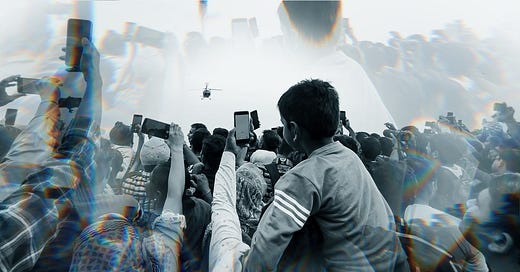We were made to support each other through impossible times.
On honoring global suffering and personal overwhelm in a world that demands we choose
We weren't designed to process global tragedy at breakfast, respond to work emergencies at dinner, and fall asleep to doom-scrolling at night. Our nervous systems never consented to this arrangement.
I said this the other day and somebody responded: "there's people being bombed right now. I think we'll make it."
I responded, "believe it or not, we can hold space for multiple truths at once."
I need to expand on that.
As someone who is furious and heartbroken about what is happening in Palestine, in the Congo, in Sudan, in Haiti, in Yemen, and to oppressed peoples worldwide, I can also see that we are not ok.
None of this is ok. The world is not ok.
It is taking a profound toll on our collective wellbeing, eroding our capacity for the empathy that we desperately need.
We’ve developed a “hierarchy of suffering” where acknowledging overwhelm feels shameful—selfish, even—in the face of more “legitimate” pain
But our brains and bodies were never equipped to bear witness to so much pain, across such vast distances, in such relentless succession. There is no evolutionary precedent for this level of global awareness.
I will never use “people are being bombed right now” to diminish the toxicity of what is happening in America, and I will never use the toxicity of America as an excuse to be apathetic about what is happening worldwide.
The systems of oppression operating globally are connected to those operating locally. The military-industrial complex that bombs children overseas is funded by the same economic systems exploiting workers domestically. The climate crisis affecting vulnerable nations first will eventually touch us all. These stories are not separate.
I am scared, and angry, and overwhelmed, and a bunch of other emotions that I might never be able to fully process.
I find myself cycling through rage, despair, determination, and bone-deep exhaustion—sometimes all within a single hour.
You probably do too.
And admitting this isn't being weak, nor is it being dismissive of the atrocities being waged worldwide; it's honesty about the unsustainable psychological burden that we're carrying.
Here’s the thing: as wild as this world is, I know that I can’t afford to become numb. I can’t let my overwhelm turn into perpetual complacency.
The moment we surrender our capacity to feel outrage, grief, and love is the moment we surrender our humanity. And our humanity—our ability to see ourselves in others despite distance and difference—is exactly what we need to preserve.
I’ve donated, and will donate more when I can. I’ve amplified the work of organizers on the ground. I’ve done the best I can, while feeling as though my best is wildly insufficient.
This tension—between what we can do and what needs to be done—is something we must learn to hold without breaking. It isn't hypocritical to acknowledge your limitations while striving to exceed them.
I don’t know how we can truly find peace in a world that is falling apart at the seams, but I do know this:
We were made to support each other through impossible times.
Before we had the internet, and 40-hour work weeks, we had each other. We had shoulders to cry on. We processed trauma together, shared resources, and found meaning in collective resilience. This is our inheritance.
We need connection and community, more than ever.
We need to hold multiple truths; that bombs are falling on innocent people, that systems of oppression continue worldwide, that many of us are struggling with the weight of it all—and that our collective liberation depends on our ability to stay human through it all.
Your capacity to care is not measured by your willingness to destroy yourself. Choosing martyrdom serves no one. Find your way to show up.
Maybe it’s through teaching, organizing, donating, creating art, having difficult conversations, or simply witnessing with an open heart.
Rest when you need to. Then, show up again, because all of our futures are bound together.
There is no precedent for the psychological terrain that we are navigating.
But here we are.
The path forward does not lead through numbness, nor does it call for us to look away. It calls us toward a radical integration of awareness and boundaries, of global consciousness and local action, of bearing witness and knowing when to close our eyes and rest.
Together, in community, we find our way.
When the screens become too much, we turn toward each other. We rediscover the power of touch, of shared meals, of showing up in person. We make eye contact. We listen to stories without relying on algorithms to decide what matters. We practice collective action and rest as resistance.
This is how we remain human in inhuman times. This is how we persist. This is how we keep each other alive. And this is how we begin—not someday, but today—to heal the world.






Thank you, Michell. This piece is beautiful. I think people who experience chronic pain/illness learn that comparing suffering is pointless, and I appreciate that you have addressed this with such compassion and honesty and I hope that it will help others to understand too. Suffering is suffering. We’re better served by supporting each other in whatever ways we can. Thank you for being a light in these heavy times.
Damn.
“Our nervous systems never consented to this arrangement.”
Perfectly said.
“We were made to support each other through impossible times.”
I truly believe that, even on days I can't remember how.
Thank you for articulating what so many of us are feeling.